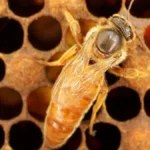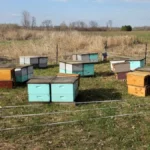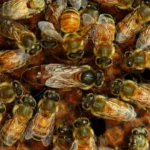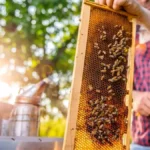In this article, we take a look at bees and your neighbors and the law. We investigate whether it is legal to keep bees in a residential area. Backyard beekeeping is becoming fashionable – but is it legal? Can you have a beehive in your backyard? The short answer is yes and no and use common sense. The long answer is below.
Bees and Your Neighbors and The Law
If we ask ourselves the question “Can I have a beehive in my backyard?” we need to look at whether backyard beekeeping is legal. To do this you will need to find out if it is legal to keep bees in your residential area.
The US Legal System
To say that the legal system in the USA is complex would be an extreme understatement. There are multiple layers of law, from the Federal Level to State Laws, right down to local County laws.
Generally where you can run into complications with beekeeping being illegal in your backyard will be at the County Law level.
In this regard, check with the local beekeeper associations to find out what your legal obligations are for beekeeping.
Before we go much further, let us have a look at what problems bees can cause, and whether these have legal implications. We will start with minor problems and move up to major problems.
Minor Problems
Bees On Neighbors Flowers – Possessive Neighbor
The neighbor finds that there are bees on the flowers in their garden. They know you have bees. They accuse your bees of stealing their honey. Solution – give them a bottle of honey. If the problem continues the neighbor is problematic, and will most likely escalate the situation. Maybe move, or don’t keep bees in your backyard. These sorts of idiot neighbors just don’t get better. Ever.

Learn more about: How Does A Bee Get Oxygen?
Bees On Neighbors Flowers – Neighbor Stung
If there is a bee on a flower and your neighbor gets stung by it, they will normally blame your bees. It could actually quite easily have been a bee from miles away, but they will still blame you. Explain to the person that bees fly up to 4 miles from a hive and that it is probably not even your bee.
Explain why bees are so important to the environment. Give them a bottle of honey. If the problem persists, consider that this is a problem person and the situation will escalate. Keep bees elsewhere.
From a legal perspective, if someone gets stung by a bee on a flower, it is really difficult to prove that the bee was yours. If the person who was stung keeps a bee and then goes the legal route, they could get authorities to obtain a warrant to come and take bee samples from your hive and test the genetics.
In this unlikely event, there are many bee experts who can pour so much confusion on the accuracy of bee genetics, and bees drifting, and a thousand other things, that you could probably evade any liability.
This will however waste a lot of your time. And time is honey so rather just don’t keep bees near neighbors like this.
Major Problems
Bees Go On A Rampage
Bees can sometimes just go nuts. When this happens, they will sting everything they can find within 50-100 yards of the hive. This does not matter if your bees are European bees, African bees, or a mix. When bees go crazy, they go crazy.
Angry bees will sting dogs, children, adults, livestock, chickens, pet birds, and almost anything else they find offensive. A common cause of bees going nuts is children.
Children are curious animals and have strange ideas. When I was a child my friend and I tried to rob a hive by breaking a hole in the lid with a large rock. This did not go well and there were a lot of stung people, pets, and dead chickens.
Children are also inherently dishonest. They will lie that they did not do anything, and sometimes they will get away with it. In many cases, the children that cause problems with bees are not even your own children. In some cases, it may be your neighbor’s kids who rile the bees up, get stung, and then you end up in legal complications.
Bees can also get riled up by lawnmowers – they hate the smell of cut grass and gasoline.
If you cannot keep bees in a place where they are at least 80 yards away from neighbors, secured from kids, and not in the line of sight of a lawn then I would advise against keeping bees in the backyard.
In Summary
If you have a big backyard, friendly neighbors, no lawns near the place to put the bees, and all your animals and kids can get away from the hives if they get angry, you can keep bees. This will also depend on your local laws and bylaws.
If you found this article helpful, please share. We need bees in our urban areas to pollinate flowers and bring food back into the urban ecosystem.
Read more about: How To Raise Honey Bees For Profit

Dr. Garth A. Cambray is a Canadian/South African entrepreneur and beekeeper with 28 years of experience in apiculture and specializes in adding value to honey. His Ph.D. research developed a new advanced continuous fermentation method for making mead that has resulted in a number of companies globally being able to access markets for mead. His company, Makana Meadery, exports honey mead to the USA where it is available to discerning connoisseurs. He has also developed technologies to commercially manufacture organic honey vinegar in Zambia for export globally. He holds a few patents globally in the ethanol industry and believes in technology and knowledge transfer for human development and environmental sustainability. One of his proudest achievements is the fact that the wind farm he started at one of his old apiary sites has essentially made his hometown carbon neutral.






